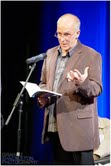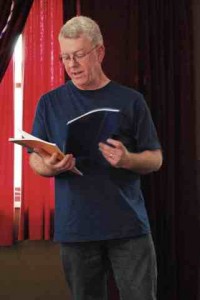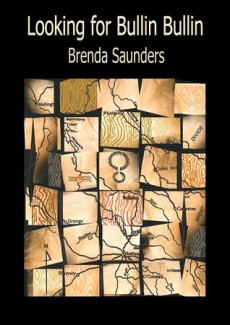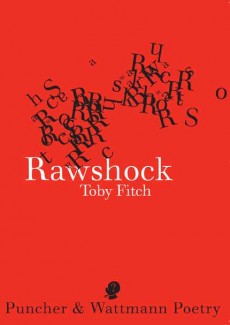June 1, 2013 / mascara / 0 Comments
 Corey Wakeling lives in Melbourne. His poetry appears in Australian and international journals and anthologies. He is the author of chapbookGargantuan Terrier, Buggy or Dinghy (Vagabond Press, 2012) and Goad Omen (Giramondo, 2013). He is reviews editor of poetry journal Rabbit, and interviews editor of Cordite.
Corey Wakeling lives in Melbourne. His poetry appears in Australian and international journals and anthologies. He is the author of chapbookGargantuan Terrier, Buggy or Dinghy (Vagabond Press, 2012) and Goad Omen (Giramondo, 2013). He is reviews editor of poetry journal Rabbit, and interviews editor of Cordite.
Mute
His hands silenced me, mute the epiglottis
made windowpane from which
and so disturbed by outside mania the hands
about others like dogs on a calf dog us.
More cuneiform plateaux without but
undisturbed since none live there surmounted.
All scrub rustles but binocular O’Casey
and the scramble, drifting lost for voice
but humming like turbines. Laburnum.
Lantana. Drift, in pools. That was where, intermission
of steady passage to the wax arrangements,
most rent the voice thrown clatters
disturbed by chance from the plainness
of clock face in Carlton,
the plainness of crime at the site of the Russian
juniper. Orthodoxy too, one guesses. Won
garsons. Turnpike to the grotto at estuary’s
diminishment, but surprise reflection
of state Narcissus.
Yours his hands steady, clockwork. Cur whelp to voice
in the juvenile zeit.
May 31, 2013 / mascara / 0 Comments
 Jan Owen’s most recent book is Poems 1980 – 2008. A selection in Dutch, Der Kus, was published in 2010, and a New and Selected, The Offhand Angel, is forthcoming in the UK with Eyewear Publishing. Several of her Baudelaire translations will be included in a future issue of Modern Poetry in Translation.
Jan Owen’s most recent book is Poems 1980 – 2008. A selection in Dutch, Der Kus, was published in 2010, and a New and Selected, The Offhand Angel, is forthcoming in the UK with Eyewear Publishing. Several of her Baudelaire translations will be included in a future issue of Modern Poetry in Translation.
Flittermouse
Elusive as Derrida
at the eastern edge of absence,
the tiny beast came through more slant
than Emily D in Sunday black –
a slashed-off scrap of dusk,
Venetian appliqué round a mask
glimpsed at a window over the Grand Canal,
Vivaldi played two rooms away.
Lobbed from nowhere onto the desk
in a shocking slippage of air,
grief’s gift paper sleeked its own dark nub,
a grinning foetus between the books and the cup,
myopically pulling itself together,
eerily looming, flumping towards me twice.
Then off to the frame of the Japanese print
to hang like disshevelled sci fi, gravity’s womb
or a scatological statement on art.
I let it be all night through chittering dreams
but woke round dawn as out to the square world’s
inconvenient corners it veered,
tracking its own grace notes to where
at last out the fast thrown-open door
it took my breath away
like an exorcism,
that most intimate loss.
Outside the Museum
Against the traffic’s roar
some small pipsqueak was giving
its territory away
with five clear-glass notes here
and five more there
like memory echoes in
the stripped trees’ mid-December air
so twig by twig by twig
one naked plane was hung
with limpid silver baubles of sound
like a boutique musical pine
with the unseen wren
so much ahead of itself
so much a sprung intention
it seemed the tree was plucking
the bird from note to note
from now to now
playing its flight in silver palindromes.
Passing below
our trivial quarrel held its ground
with words like dead bells
melted down for guns
till aptly we went underground at Iéna
parting finally at a corridor junction
grey as a tunnel in purgatory
no buskers at any coordinate
of space or time.
May 31, 2013 / mascara / 0 Comments
 Terry Jones’ debut short collection, Furious Resonance, was published by Poetry Salzburg in 2011. That same year he was the winner of the Bridport Prize. His work has also appeared in magazines including Poetry Review, The New Statesman, Agenda, Ambit, The London Magazine, Magma, Iota, Communist Review, The North.
Terry Jones’ debut short collection, Furious Resonance, was published by Poetry Salzburg in 2011. That same year he was the winner of the Bridport Prize. His work has also appeared in magazines including Poetry Review, The New Statesman, Agenda, Ambit, The London Magazine, Magma, Iota, Communist Review, The North.
Sun
Let X be the sun:
between number and number the rage star burning; Xanthic helllight, Sunflower atom-pisser, imaginary
ghost flower.
Starts with clot of ochre
Impasto sun-mould the ur-text in outline paradigm mud-pat
A child’s sun isotope of yellow wax its surface storms
Upstroke the sun’s sign
On papyrus whirlpool of x-rays
a violent flower at zero
Furious stalk the inferno uncodes and black it is black a black funeral
feather World-black negative dark flower Gamma plant blazer Anarchist icon
O common star Sulphur flower the light star’s dark grammar
Is hossanah breath and bone swastika Solomon’s Seal
At heart it reads off Signifier Sigma
Sonne sunne A sol-fa
its energy a base petal pions’ spore Morpheme it flashes out
Struck flint Mi
Mi
Mi
The dawn flower Alpha Aaron’s Rod Gospel gold-leaf
To liquid sets elixir the dusk rose Giaconda Will-o-wisp light text
Glows oil out plumes out
Marigold Madonna Yellow ink on paper
Its syntax figured
complex Flowering Kells Book wrought Of roots enchanted Carnival chromosome
Writhing writing Rag-and-bone strange rose Torch of anti-matter Old rope manuscript
Ultra-violet hieroglyph
but penned
Coded.
May 31, 2013 / mascara / 0 Comments
 Mark Roberts is a Sydney based writer and critic. He is currently editor of Rochford Street Review and P76 magazine. He was widely published in Australian literary magazines and journals during the 1980s and 90s and has recently emerged from a long hibernation. His book Stepping Out of Line was published in 1985.
Mark Roberts is a Sydney based writer and critic. He is currently editor of Rochford Street Review and P76 magazine. He was widely published in Australian literary magazines and journals during the 1980s and 90s and has recently emerged from a long hibernation. His book Stepping Out of Line was published in 1985.
Martyrs’ beach
the seaweed was blood red
we stood on the sand
and watched waves
hurl bleeding clumps
at the regenerating dunes
at the local museum
we find buried at the back
of a yellowing scrapbook
a reference to a seaside massacre
of aboriginals who had
‘trespassed on prime grazing land’
near the front door
a hand written label
in a wooden showcase
full of spear fragments
announces
“little is known of the way of life
of the original inhabitants of the area”
After arrival – storm at sea
running like children
past the old midden,
protected by a rusty sign,
we burst onto the beach to be confronted
by the stench of dead mutton birds.
they stretch in a decaying black line
along the high water mark.
others lie rotting, caught on the rocks
at each end of the beach.
we climb over the headland
to the next beach
to find the carnage even greater
a wall of feathers bones and maggots
piled high.
in the general store
the talk is of pollution –
oil spills up the coast
or poison feed.
But in the bottle shop
an old woman
tells us of a storm at sea,
of birds dropping
exhausted into the waves.
May 30, 2013 / mascara / 0 Comments

Jo Langdon is the author of a poetry chapbook, Snowline (Whitmore Press, 2012). She lives in Geelong and is currently completing postgraduate studies at Deakin University.
Hauptbahnhof
We suck down saltless air and the light’s gone
strange—mountains hiding
their greenery,
swallowing time.
In Vienna it was pigeons, feathers
slate-coloured and your camera full of them.
(Bodies filthy, grained and small
in the instant.)
I want you to see it all,
as I remember: in miniature, like a snow-
glass sequence.
Afterimages curved in crystal
compartments—drift
of snow that does not melt, does not build
in shape or artefact:
not the tilting flowers, starry edelweiss;
not bright air in singing hills,
or the zigzag of ice between us.
Sonnenfeld 17
The kitchen lit with snow light
your first morning here
again
and winter somehow cleaner: air
low and blue on the streets.
Deep in the night, trucks salt
the roadways; mountains lean in
on your sleep.
You wake to find shadows
unpinned and shifting
in barest light—
your face, a quiet hologram,
in looking glass that will not hold
melting garden snow.
May 29, 2013 / mascara / 0 Comments
 Looking for Bullin Bullin
Looking for Bullin Bullin
by Brenda Saunders
Hybrid Publishers, 2012
ISBN 1921665904
Reviewed by MARGARET BRADSTOCK
Embracing her Aboriginality has given Brenda Saunders both a focus and a purpose in her recent poetry collection, Looking for Bullin Bullin. Writing over the last decade, Saunders has, as she herself says, “a lot to say about the urban Aboriginal experience.”
The poems in Looking for Bullin Bullin are organised into four sections, reflecting aspects of post-1788 Aboriginal history: Stolen, Caring for Country, Living Blak, and Drawing the Landscape. A number of poems overlap several categories, but an underlying chronological movement is also at work. Stolen encapsulates the loss of country (“Terra Nullius”, “Un-titled”), of lifestyle, culture and heritage:
The stolen child lives her life ‘in service’
Her stories sit tight
in her apron pocket
Each loss pencilled-in
Her lists of defeats
fade with time
− hopes scratched out
after years of waiting
(“The telling,” p.15)
Wry humour makes its point in “Sydney Real Estate: FOR SALE“:
Bennelong:
Vogue
Penthouse suite
World
address!
corroboree
below
Kirribilli:
High Rise
Harbour life
A Must!
…………………
bora rings
circle round
Maroubra:
Lots
Prime
Virgin land
A Steal!
(pp.12-13)
Caring for Country concerns itself with the continuing and increasing damage to the Australian environment, in the name of ‘progress.’ In “Toyota Dreaming,” the views of old and young Aboriginal people are opposed, the old ones not understanding the need for change, the young compliant, seeking a perhaps illusory recompense for what has been lost:
The tribes can see the value, the power
in red shale; they sift their Country’s losses
against solid gains. Working for the Company
lured by the shine of a crystal trinket harder
than stone. Buried treasure of the River Spirit
gleams forever in the white man’s dreams
(p.22)
Significantly, from the time of poet Kevin Gilbert, the Toyota has become an objective correlative in Aboriginal-authored verse for feelings aroused by government control. (See also Melissa Lucashenko’s “You are the Fringes,” amongst others.) In this regard, one might contrast the different viewpoints expressed in Saunders’ poem with the progressive stance of indigenous Boyer Lecturer Marcia Langton:
My first visit to the Kimberley’s Argyle Diamond Mine − the world’s largest producer
of diamonds, owned by Rio Tinto − was in early 2000. At that time, there were four
Aboriginal employees. Two of them were gardeners. Two years later, there were many
more…..[Brendan] Hammond revolutionised the culture of the Argyle mine, and today
the rate of Aboriginal employment at that mine stands at 25 percent of the total workforce.
Many of the significant changes in the Aboriginal world are due in some part to the
changes in the mining industry, which offers employment and contracting opportunities
as an alternative to welfare transfers upon which many remote and regional Aboriginal
communities depend.
(“On the cusp of a new dawn,” News Review, The Sydney Morning Herald, Nov.17-18, 2012.)
In “Pay-back in ’78,” the narrator arrives in Brewarrina as an outsider, to hear of wild Blacks pitted against town-dwellers (as in the early days), and find the town itself an anachronism:
Someone had burned the station one night
They’d already torched the only pub
Hotel swings from the Liquor Outlet now
a no-frills affair: roller-doors down at ten
And we’d heard talk of wild kids, good with fire
living on the edge of the next failing town
…………………………………………………………….
Dodge City‘s on the edge of nowhere. Off-limits
to finger-pointing tourists or ‘blow-ins’ like us
This painted landscape is already too old
or too new for change. Shaped
by late-model cars
− white goods rolled in dust
Useless inclusions in houses
that never had power or water
(pp.25-6)
“Jaandoo” depicts the relationship of artist Rover Thomas with his country, described through close observation of technique:
Rover carries his country under the skin
follows his Wild Dog song
roaming the sand
…………………………………..
Rover tracks each sacred meeting
marks his Dreaming on painted boards
set in a line of dots
(pp.28-9)
As an artist herself, Saunders is well-placed to utilise artistic technique as a metaphor for feelings and emotions. Other poems similarly explore the work and inner landscapes of Ginger Riley, Emily Kngwarreye and Kathleen Petyarre.
The anonymous poem “Tanimi” reminds us poignantly of the loss of many Aboriginal languages and the need to recover and preserve them:
Without our language
we will have nothing to say
Have to close our mouths
No song, no story
when the words
want to come…
(p.33)
In Living blak, the reader is confronted with aspects of the urban Aboriginal experience, scenes of largely unmitigated conflict, homelessness and hopelessness. “Blak-out” pulls no punches, depicting the outcome of social and cultural breakdown whereby the protagonist is both victim and perpetrator.
Gimme a dolla’
Pay the rent
whitey guilt
easy street
…………………
tradin’ for cuz
speedy in the fast lane
live for the day
ridin’ trains
singin’ up Country
Dreamin’s free
(pp.48-9)
“Blak boys” rejects any form of overt stereotyping, but a similar bleak future unites the different personae of the poem:
He’s everywhere and nowhere, he’s that shadow doing time
slipping out of focus
in the world outside
(p.52)
This section of the book employs a racy, spare style, utilising urban Aboriginal idiom and taut lines that give credence to the subject matter. A number of the poems appear at first to be merely descriptive, but their message is conveyed through dialogue and circumstance.
“Looking for Bullin Bullin,” the title poem and arguably the best poem in the collection, works to pull all sections together, and the cover image (Saunders’ own) reflects this relationship. “Got any change?” asks the Aboriginal girl in this chance encounter, but, unlike the protagonist of “Blak-out,” her questions soon deepen to take in cultural loss, suppression of place-names and language, and white ignorance of Caring for Country. The chopped-up map, with Bora rings at centre, becomes a metaphor for all these losses, and Bullin Bullin the symbol of a stolen heritage:
I’ve searched on early maps
Find only new names for
ancient places. Land Titles
staked out. Station holdings
Towns with strange rhythms
Sounds from another world
(p.62)
In light of this white-out of history, the current move to restore Aboriginal place-names to sacred sites and landmarks can only be applauded.
A recurrent approach emerges, played out in the final section of the book, Drawing the Landscape, with descriptions and interpretations of artworks by Russell Drysdale with Aboriginal subject-matter. Drysdale first became interested in Aboriginal people while visiting North Queensland to attend board meetings of his father’s sugar mills. In particular, he was concerned by indigenous dispossession during the early ’50s, when Australia tried to solve what they called the ‘Aboriginal problem’ by integrating them with white society. His drawing Shopping day, 1953 shows how badly and sadly that identity sat upon their shoulders. Other drawings likewise lend themselves to a contrast between “a distant time/ when the tribe roamed freely” and the imposition of “the white man’s gaze” (p.69).
Looking for Bullin Bullin stands as a requiem for Jack Davis’s “dark proud race” (“The First-born,” ca.1970). Whether we choose to see it that way, or to take hope for a future “in unity” remains with the reader.
MARGARET BRADSTOCK has five published collections of poetry, including The Pomelo Tree (awarded the Wesley Michel Wright Prize), Coast (2005) and How Like the Past (2009). Her sixth collection, Barnacle Rock, is forthcoming from Puncher & Wattmann in April 2013. Margaret recently edited Antipodes, the first anthology of Aboriginal and white poetic responses to “settlement” (Phoenix, 2011).
May 29, 2013 / mascara / 0 Comments
 Rawshock
Rawshock
by Toby Fitch
Puncher and Wattmann, 2012
ISBN 9781921450617
Reviewed by FIONA HILE
Luminosities
The few lines of biography on the back cover of Toby Fitch’s first full-length collection of poems, Rawshock, remind us that he was ‘born in London and raised in Sydney’ whilst a recommendation gleaned from the launch speech given by the poet, novelist and academic, David Brooks, describes Fitch as the ‘Apollinaire of Avalon’ and the ‘Lorca of the Inner West’. There would be nothing more to say about these sketchy empiricisms if it weren’t for the many ways in which the poems that comprise the collection take up origins, mobilities and the impossibility of presence as their themes.
The poems that most fiercely and vibrantly perform these ideas occupy the twenty-page sequence, Rawshock, the title of which constitutes the phonetic rendering of the famous Rorschach test, a series of inkblots devised by the Swiss psychologist, Hermann Rorschach, and deployed by ingenuous psychologists during the 1960s as a means of detecting underlying thought disorders, ‘especially in cases where patients are reluctant to describe their thinking processes openly.’ You don’t need to be Michel Foucault to feel hyper-invigilated by the idea of one of your fellow humans falling back on interpretation as a diagnostic tool. Or need a Graduate Certificate in Bakhtinian formalism to recognise the symptoms of ‘thought disorder’ – alogia, echolalia, derailment, semantic paraphasia, to name a few – as the stock-in-trade of the poet, the novelist, the playwright. Precisely what it is that constitutes a thought disorder is, these days, mercifully up for debate and it seems to be agreed that such phenomena can be indicative of, for example, ‘incomplete yet potentially fruitful thought processes’. Fitch’s ingenious move is to have ‘married’ the out-of-copyright inkblots with one of the most enduring myths of Western aesthetics. This unlikely coupling has produced a series of poems that re-stages the fates of Eurydice and her estranged husband, Orpheus.
The book’s epigraph, drawn from Lewis Carroll’s Alice’s Adventures in Wonderland alerts us to what will be at stake in this operation. As Carroll writes, ‘The queen had only one way of settling difficulties, great or small’. Fitch’s decision to include the queen’s command comes to be read not only as the strategic management of the difficult matter of the reader’s entrance into the text but also as the highly ceremonial if somewhat macabre celebration of this initiation. As Derrida wrote of Mallarmé, the name marks ‘the production and annihilation of the thing’ (116). In the poems that follow, Fitch stages a reconsecration of ‘the Mallarméan doctrine of suggestion, of undecided allusion’ (120) so that the atmosphere of the book – from the typographical bonfire of Matthew Holt’s front cover to the final poem in which the day is ‘uncorked like a bottle rocket (“nightcap”) – is ‘alive with evaporating sparks.’ (“Blackout” 27)
The book is divided into three sections – Everyday Static (poems previously published in the form of a chapbook by Vagabond Press), the Rawshock sequence, and Oscillations. It is commonplace to think of the poet as working out philosophy through the poem. More accurately, as the philosopher Alain Badiou has it, ‘philosophical poeticizing’ is best left to the philosophers, leaving the poem free to consist in ‘these two thoughts … the presence of the present in the transfixion of realities; and the name of the event in a leap outside of calculable interests.’ (42) The propensity of the poems collected here to work in these modes is evidenced throughout, not least in the accumulation of influences and ideas that structure the book. Although recent reviews of Rawshock have noted the influence of Rimbaud and Apollinaire – and Fitch has noted [1] also William Carlos Williams, Auden, Ashbery and Baudelaire – most insistently in evidence is the influence of Mallarmé, in the emphasis on the poem as an object ‘made of words and not of what words are used to produce’ and in the typographical and mechanical construction of the book, wholly constituted in the white space of the letter.[2] This influence is most in evidence in the Rawshock sequence, where OU ‘doubles’ the form of one of the Rorschach images:
O U
Can collide
With a bus “in error”,
hold shrapnel and rocks aloft on your way
(( down to Erebus. You can seduce the ))
( ferryman, queen Persephone, have )
( the fatty-fat, serpent-backed )
Cerberus melt in your palm,
caress his moth-eaten earlobes
as the Furies snivel at your feet,
stop Sisyphus in his tracks, Ixion’s wheel,
Nyx and the Styx as stoned as onyx. You caN
Collude with Chaos all you like, but you can’t waive
The fact like my father Apollo did:
E don’t need to follow
t h e s u n
Mallarmé famously wrote that a throw of the dice will never abolish chance. More specifically, he wrote that ‘Out of a number of words, poetry fashions a single new word which is total in itself and foreign to the language [langue] … Thus the desired isolation of language [parole] is achieved; and chance (which might still have governed these elements, despite their artful and alternating renewal in meaning and sound) is thereby instantly abolished.’[3]
Badiou nominates Mallarmé’s method as one of ‘subtraction and isolation’ and what this method achieves is the poetic inscription of ‘the absence or hush’. Perhaps this yearning for the concomitant ‘production and annihilation of the thing’ in some way accounts for the snake’s lament in the second poem of the Rawshock sequence
I want my sssshh ssshhadow back:
Towards the end of the poem the poet has achieved something of a Mallarméan disappearance as ‘the ocean ebbs away’. Still, the hint of a 21st Century sequel – ‘C you in the sHades’ beauty’ – suggests that these days ‘the hush’ doesn’t always come so easily.
The first sequence of the book – Everyday Static – provides an account of why this might be the case. It can be broadly cast as the identification of the ethics and pitfalls of the Postmodern. The situation is immediately revealed to be one in which a poet or a poem ‘could almost crack open the night’ and drink (“On the Slink” my italics) if only there weren’t all of these tangential moonbeams to deal with, batting their eyelids at bull-bars and generally ‘tearing the chest muscles of … any man with a memory’ (“Tangents”). “Beelines” calls to mind Francis Webb’s ‘a thousand warm humming stinging virtues’ (“Poet”) and Baudrillard’s ululating Simulacra and Simulation in which ‘the world is hardly compatible with the concept of the real that we impose upon it’. This identification of and with the loss of the real triggers the self-imposed ‘fatal strategy’ by which Baudrillard hopes ‘not to reconcile, but on the contrary, to seduce, to wrest things from their condition’. Thus, for Fitch:
the blue car makes a beeline
for a lamppost, the traffic light
goes gridlock-orange, a bullet train
is trapped on never-green tracks,
and jets fall out of a marooned sky;
why, on waking today, my vision stings
and my face is puffy: dreaming
is forced to move along paths
that are too well-paved.
I’ll sleep with my eyes open,
stop my shadow running away.
Inevitably, there are salves, balms and antidotes, all administered with varying degrees of efficacy. In “Twirl”, ‘we were, we were’ becomes ‘we whirr, we whirr’; still, the foxy light catches up with us and we can’t escape the smell of someone else on our skin (“Aubade”). An aubade is strictly speaking ‘a song from a door or window to a sleeping woman’ and Fitch here and relentlessly elsewhere demonstrates the propensity for an ‘achieved anxiety’ that can be said to permeate the book as a whole. If, as the epigraph to the second sequence drawn from Blanchot’s ‘The Gaze of Orpheus’ suggests, art arises out of Orpheus’ botched attempt to retrieve Eurydice, this first sequence hints that it is not only the distancing of doors and windows that produces poetry but the inescapable scent of proximity.
Some of the poems in the second sequence, then, seem riven with the desire for severance – ‘Skull the ether! Cut me out o this / chrysalis so I can sing of asterisms winking / & dice rolling, so I can wing it thru buildings / like a lunar scythe.’ That the poems achieve their particular identity by replicating the shape of the Rorschach images seems of some assistance. Two poems later,
Ni ght
is so
bri ttle
The use of Mallarméan espacement, then, astutely oscillates the flow rate of Eurydice’s proximity. As Attridge, writing on Mallarmé, points out, all language ‘can be understood in terms of “writing”: the marks and white spaces on the page are only one realization of the articulations and systems of difference upon which the operations of signification rely, and which at the same time prevent signification from ever closing on itself or on the world.’ (110-11)
But Eurydice, perhaps spurred on by the preponderance of the image, can’t seem to keep away – ‘It was then that E walked up beside you’. (8) What follows is an almost Shakespearean summary of the kind of infernal mess lovers are so adept at getting themselves into: ‘I told you / ou not to look at me. ou/ o Not because u / I didn’t want to go back / but because E thought that was / what you wanted.’ All of which provokes the question ‘Who is ’E, anyway?’ The often invoked but rarely seen ‘feminine’ or just another romantic homme o’ nym(ph)?
Ultimately what this sequence reveals – for this reviewer at least – is that hell might be a place where hermeneuts go to cook up stodgy readings of poems that, like Eurydice, hide under a veil and constitute ‘the profoundly obscure point toward which art and desire, death and night, seem to tend.’ (171) In “Orpheus’ Gaze”, Blanchot suggests that ‘turning away is the only way [looking at the center of night in the night] can be approached.’ (171) In the third sequence, then, Fitch’s strategy is ‘to bring Eurydice into the daylight, to make the daylight more luminous through the visibility of Eurydice’ (Bruns 70). To do this, the poem is going to have to look away, to give up, as Blanchot has it, on ‘the movement of desire that shatters the song’s destiny’ (176).
The visual similarity of the first sequence, Everyday Static, to the third, Oscillations, suggests that despite everything nothing has changed. These are attractive poems with titles that evoke their subject and deal with it. Occasionally, they are moved to wind themselves across the page cloyingly as with “Emotion Sickness”. Sometimes they use the demarcations of the book to more ingenious effect as with “Nightcap” which spreads its title across two pages and starts ‘The only way to cap / off the night / is to decapitate yourself.’ (84-5) The poem fans itself across the facing pages Hermes-like in the form of a pair of elegant wings and for many weeks I only registered the right-side poem which I’m embarrassed (but also amused and in a weird way, proud) to say I thought was called “tcap”. The eventfulness of the middle sequence, then, produces a ‘tiny displacement’ so that, as Agamben wrote in The Coming Community, ‘everything will be as it is now, just a little different.’ (51) Agamben calls this ‘supplement added to perfection’ the halo. For Agamben, the halo signals ‘a paradoxical individuation by indetermination.’ (53) What we thought was finished and perfect is rewarded with a supplementary glow – ‘The being that has reached its end … thus receives as a gift a supplemental possibility.’ (55) This measured yet brightly glimmering end gives the reader something to think about. Perhaps Lacan was right about the inarticulable supplementary jouissance of the feminine and that when woman speaks of love she does not know what she is saying, even if Lacan does. Or, perhaps, as Fitch seems to be arguing, woman knows very well what she is saying and it is only man who hears the voice of Eurydice as if from the ‘red-carpeted jaws of hell-bending doublespeak’ (Dry, Mainly Sunny).
Works Cited
Giorgio Agamben. The Coming Community. Trans. Michael Hardt. Minneapolis: University of Minnesota Press, 1993.
Alain Badiou. Conditions. London: Continuum, 2008.
Maurice Blanchot. The Space of Literature. Trans. Ann Smock. London: University of Nebraska Press, 1982.
Gerald L. Bruns. Maurice Blanchot: The Refusal of Philosophy. Baltimore: John Hopkins University Press, 1997.
Lewis Carroll. Alice’s Adventures in Wonderland. New York: St Martin’s Press, 1974.
Jacques Derrida. “Mallarmé” Trans. Christine Roulston. Acts of Literature. Ed. Derek Attridge. New York: Routledge, 1992.
Toby Fitch. Rawshock. Glebe: Puncher & Wattmann, 2012.
FIONA HILE was a joint winner of the 2012 Gwen Harwood poetry prize. Her first full-length collection of poetry will be published by Hunter in 2013. She tutors in Literary Studies and Creative Writing at the University of Melbourne.
May 18, 2013 / mascara / 0 Comments

Ranu Uniyal teaches in the English Department at Lucknow University. She received her doctorate from Hull University, UK. Her work has appeared in Sketch Book, Twenty 20, Muse India, Kavya Bharati, Femina, Manushi, Indian Literature, Littlewood Press and other literary journals both in India and abroad. Her poems have been translated in Hindi, Urdu, Uzbek and Malayalam. She has published two poetry collections. Across the Divide was published by Yeti Books in 2006 and December Poems by Writers Workshop in 2012.
Love lies
Smoking veins that run wicked like
An old nanny whose time is running out
Doors have been closed and the moon has little to offer
We get inside as if there is no haste
And we time a plenty I put aside my old grandmother’s earrings
They often get caught when it is just right between us
Such a nuisance it is to unhook all – the buttons on your chest
My shoes and slim garters – they have been there awhile
Off your smelly socks which I pretend to explore
They say nibble his toes and he will come like a flash
We breathe one other as the lights twinkle
In the sitting and I draw you in me afraid
Of the morning that has been set aside.
Love is forever you whisper in my ears
The whole of you is seeped in truth
But for the fingers they find it difficult to lie.
Death of a letter
My dear I have stopped
addressing them to you
words glide swiftly
to the wild contours
of distant shelves
that once belonged to you.
In ink I dip them not
nor do I stamp them
with suave sincerity.
Some unholy passage
lurks out of memory
and hands get still.
The alphabet is cold
and my letter
devoid of warmth
of love, of news
and address
refuses to make amends.
For a Father who taught me to smile
My father’s face
soft and grizzly washes away
clusters of sadness and I get closer
to his smiles soaked in eternal bliss.
They are with me
those scattered shades
of a sunset in childhood
unwilling to disperse.
I find him almost everywhere.
The air is floating with his
morning chants of Durga Saptshati.
The fire groans in my son’s eyes.
The waters mingled with the smoke
while his body crossed the bare sands
and this little earth so moist and green
was loaned to me as his only keepsake.
Durga Saptshati: A collection of chants in Sanskrit in praise of Goddess Durga a symbol of Shakti – female energy and creativity.
May 18, 2013 / mascara / 0 Comments

Andy Jackson’s Among the Regulars (papertiger media, 2010) was shortlisted for the Kenneth Slessor Prize. His poems have recently appeared in Meanjin, Cordite, Wordgathering and Medical Journal of Australia. He is currently working on a series of poems exploring medical tourism, and a book of portrait poems of people with Marfan Syndrome. He blogs at amongtheregulars.wordpress.com
Newsprint
The nurse asks again but you haven’t heard.
You are passing the scene in slow motion,
face pressed against the glass of the newspaper,
something unspeakable turning in your bones
like pleasure. Not relief at your safety.
Not homesickness cloaked with sympathy.
Or even some remnant you’d mistakenly
call animal. You don’t know for a long moment
who you are – the young slum-dweller
who ran through the toxic smoke to rescue
patients and now lies in intensive care?
The hospital directors taken into custody?
The crowd clamouring at the gates for the bodies
of their loved ones? Or the police
resorting to batons to subdue them?
She takes your blood pressure and temperature.
The alarms and sprinklers are switched on
and work. All the emergency exits are unlocked.
No boxes block the stairwells. Only
your fingers are black with newsprint.
Necessary
Mounds of rubbish sifted by goats, dogs,
rag-pickers, collected by trucks
of the mind. Traffic negotiated in the peripheries
of sight and sound. One purple flower
exploding beneath the flyover. The necessary
genius of a bicycle he rides with his hands,
his legs contorted and useless.
The quick blink of a white bullock
as she’s whacked again with a stick.
Six days in, and it’s beginning
to seem like I’m seeing today what I saw yesterday.
A mange-weary dog looks both ways
before crossing the road. A woman
pulls the tarp off her carefully arranged pile
of mouldy textbooks and airport fiction.
An ambulance’s quiet siren swims
through the intersection. It doesn’t matter
what day it is, where I could be. Someone
is carefully repairing a busted umbrella.
May 18, 2013 / mascara / 0 Comments
 Ken Chau is a poet living in Melbourne, Australia. His poems have been published in Australia, France, Hong Kong, UK and USA, including the anthology Growing Up Asian in Australia, ed. Alice Pung (Black Inc., 2008). He was most recently published in The Best Australian Poems 2012, ed. John Tranter (Black Inc., 2012) with his “Chinese Love Poem”.
Ken Chau is a poet living in Melbourne, Australia. His poems have been published in Australia, France, Hong Kong, UK and USA, including the anthology Growing Up Asian in Australia, ed. Alice Pung (Black Inc., 2008). He was most recently published in The Best Australian Poems 2012, ed. John Tranter (Black Inc., 2012) with his “Chinese Love Poem”.
Chinese Silence No. 101
after Timothy Yu, “Chinese Silence No. 4”
after Billy Collins, “China”
I am a flattened spider inside a discarded book of Chinese poems
on the drawing board of a curious architect.
Grand designs are being drafted.
Many bottles of champagne await opening day.
But even when he’s mad
and hurls the book across the room,
I stay as silently still as the dead,
unread words on these pages.
Chinese Silence No. 103
after Timothy Yu, “Chinese Silence No. 8
after Billy Collins, “Hangover”
If I were crowned Paramount Leader of China this afternoon
every peasant planting rice in a paddy field
would be re-educated and silenced forever
from uttering the name of Mao Zedong
Mao Zedong Mao Zedong
then would not be required to read The Little Red Book
but my My Book of Thoughts
and learn to spell Chairman Mao’s name in English
in my preferred transliteration of
Mao Tse-tung Mao Tse-tung
after which they would be quizzed
about the spelling of his name then executed by firing squad
regardless of how little they retained
of their thoughts of how
Mao Zedong thought Mao Zedong Thought would be thought of.
 Corey Wakeling lives in Melbourne. His poetry appears in Australian and international journals and anthologies. He is the author of chapbookGargantuan Terrier, Buggy or Dinghy (Vagabond Press, 2012) and Goad Omen (Giramondo, 2013). He is reviews editor of poetry journal Rabbit, and interviews editor of Cordite.
Corey Wakeling lives in Melbourne. His poetry appears in Australian and international journals and anthologies. He is the author of chapbookGargantuan Terrier, Buggy or Dinghy (Vagabond Press, 2012) and Goad Omen (Giramondo, 2013). He is reviews editor of poetry journal Rabbit, and interviews editor of Cordite.







